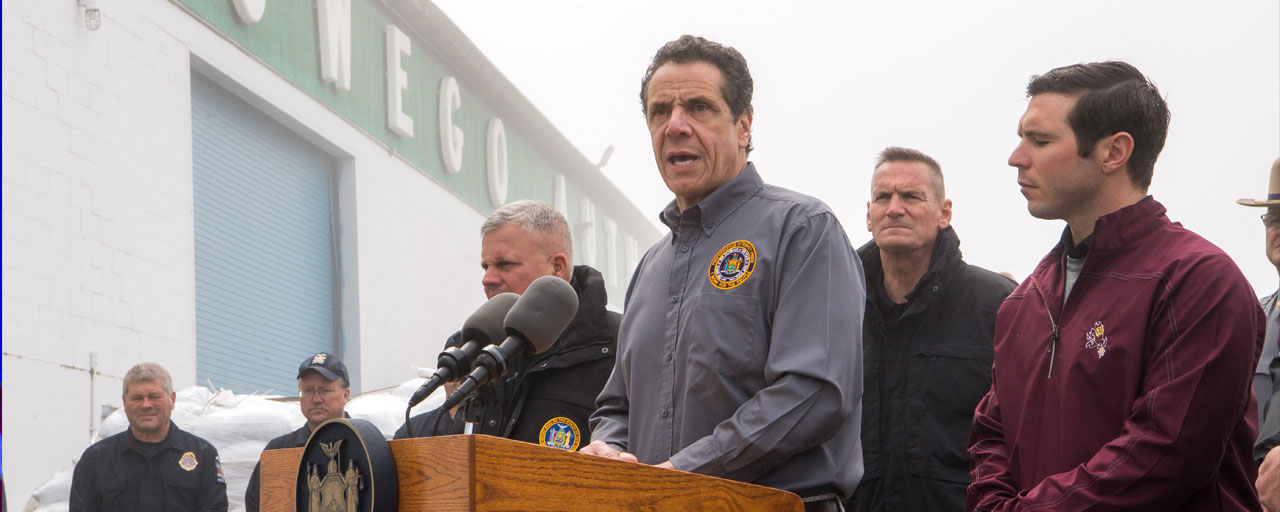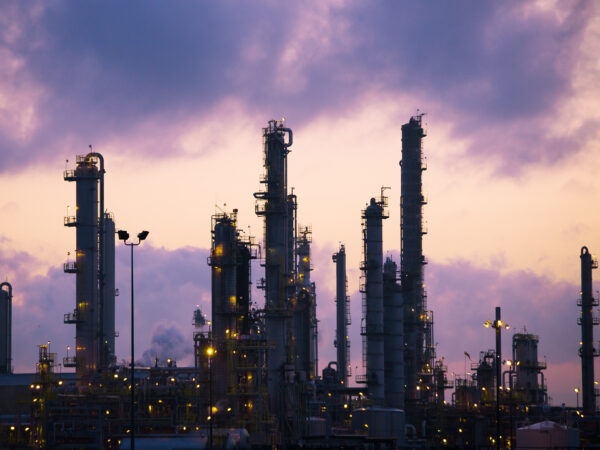
New York Gov. Andrew Cuomo didn’t wait long to make a direct connection between environmental restoration and traditional bread-and-butter policy issues like the economy and education in his annual State of the State speech in early January.
“No economic strategy, no social justice reform, no education policy will be worth a damn if we don’t have a planet that we can live on,” Cuomo said as he kicked off the policy agenda section of his speech.
Cuomo pledged that New York will lead the nation in response to climate change, which he called the “transcendent threat of our times.”
“We know the climate challenge,” Cuomo said, citing Lake Ontario’s rising levels, Superstorm Sandy and five 100-year floods in his three-term tenure.
He listed wetland destruction, dam construction and algal blooms as human-caused problems that must be remedied.
“The Earth is out of balance, and we caused it,” Cuomo said.
Cuomo’s response to the threats is a proposed $3 billion bond titled the “Restore Mother Nature Bond Act.” He wants it on the ballot in November and, if approved by voters, it will become the “nation’s most aggressive program for habitat restoration and flood reduction,” according to the governor’s website.
Green energy initiatives and a ban on single-use polystyrene foam containers are other priorities for Cuomo.
“The economy of tomorrow is the green economy,” Cuomo said as he transitioned to more traditional economic themes.
Outlier in the Great Lakes states
But New York’s Cuomo was alone among his Great Lakes colleagues in putting a spotlight on the environment in the State of the State speeches.
Michigan Gov. Gretchen Whitmer said her speech would be brief by design and would focus on roads, education, healthcare and jobs.
Repairing Michigan’s roads has been her signature policy priority and she was stymied on advancing it in 2019. The Republican majority legislature would not agree to her proposed increase of the gas tax to fund road repair. In her speech, Whitmer, a Democrat, said she would use existing authority she has to borrow money for roads, thus bypassing the legislature.
Whitmer campaigned for governor in 2018 on an aggressive water and climate agenda.
“Water is the lifeblood of our state, and the Great Lakes are at the center of it. Michigan will disproportionately suffer the impact of climate change, and rising temperatures have already done harm to our lakes, but we can change course,” she said on her campaign website.
But in her speech last week, Whitmer only made a passing environmental reference, saying “water is one of Michigan’s greatest and most urgent challenges because it touches nearly every aspect of our lives.” She pledged to talk about drinking water and climate change throughout the year.
Great Lakes Now asked Whitmer’s office to reconcile calling water issues an “urgent” challenge yet deferring comment on them to a later date instead of in the high-profile annual speech where priorities are set.
“Since the governor has taken office, she has been deliberate and focused on protecting our Great Lakes, cleaning up our drinking water, and combating the real-life impacts of climate change. Governor Whitmer will address these issues head-on in her budget next week, and she is planning to give a special message on water and climate change later this summer,” said spokesperson Chelsea Lewis last week.
Whitmer’s decision to defer comment on water and climate change issues was praised by the nonprofit Michigan Environmental Council.
“Frankly, I appreciate the nod to water issues and not getting them too embroiled in what is ultimately a political night,” said MEC CEO Conan Smith.
Smith said he expects to see investment in water in the coming budget message and he trusts “that she will follow through with bold policy proposals and strong administrative commitments.”
Other states mostly quiet on climate change
Other Great Lakes governors were as reticent as Whitmer on the environment and climate change, giving them just minor mentions in their State of the State speeches.
In Wisconsin, Gov. Tony Evers said only “we need to take climate change seriously” and that the lieutenant governor chairs a climate change task force that is working on the issue with key constituencies across the state.
Evers talked at length about the need to support Wisconsin’s struggling dairy industry but made no mention of manure spills that generally come from factory farms and pollute well water.
Wisconsin has had 450 manure spills in the past five years, including one that totaled 1.9 million gallons spilled, according to Department of Natural Resources data. Some of the spills reached Lake Michigan the DNR said.
In Illinois, Gov. J.B. Pritzker said “we saw the effects of climate change right here in Illinois last year with a polar vortex, devastating floods, record lake levels and emergency declarations in more than a third of Illinois’ counties,” Pritzker said.
“The legislature needs to address clean and renewable energy that reduces carbon pollution in the coming legislative session,” Pritzker said. He didn’t offer specific proposals but said he would not sign energy legislation written by utility companies.
Illinois is the linchpin in a region-wide plan to stop the advance of Asian carp, one of the biggest threats to the Great Lakes’ $7 billion fishery and regional tourism.
The Army Corps of Engineers’ plan to construct a chokepoint in the Chicago waterways system requires Illinois to sign on as a non-federal sponsor and share costs.
Illinois has long opposed the plan. After taking office in 2019, Pritzker indicated he was receptive to it but concerned about its cost. He has not yet signed the agreement with the Army Corps.
Pritzker’s office did not respond to a request for comment.
Indiana Gov. Eric Holcomb said “Indiana has the cleanest air and water since the Clean Air and Water Acts of the 1970s passed, and we now have four times more timberland acreage than we did 100 years ago.”
Holcomb spokesperson Rachel Hoffmeyer said the claim is based on data compiled by the Department of Environmental Management.
The nonprofit Hoosier Environmental Council offered context in a reaction to the speech in Indy Politics.
“In tonight’s State of the State Address, Governor Holcomb touted the ‘cleanest air and water’ since the 1970s. The real measure is whether Indiana is ensuring that the environment is safe for all: …On water, likely not safe if your private drinking water well is exposed to agrochemicals, coal ash, or nitrates,” said Executive Director Jesse Kharbanda.
Holcomb referenced a $436 million investment in drinking water infrastructure, and he did not mention climate change in his speech.
Governors typically follow the State of the State speech with a budget proposal that provides details on priorities mentioned in the State of the State speech.
Ohio, Minnesota and Pennsylvania’s annual speeches have traditionally taken place later in the first quarter.
Featured Image: Governor Cuomo Deploys Additional Resources in Anticipation of Potential Lake Ontario Flooding, Photo by governor.ny.gov




